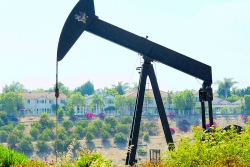The battle over a controversial oil extraction technique is moving more swiftly to the legal arena than through the state’s legislative ranks.
On Jan. 24, the Center for Biological Diversity filed a second lawsuit against state oil and gas officials to compel California regulators to enforce an existing state law that should protect people and the environment from hydraulic fracturing, commonly known as fracking.
“A looming fracking boom threatens to transform California, creating serious pollution risks to our air, water and climate,” said Vera Pardee, a senior attorney with the center. “Existing rules clearly cover fracking, but state officials don’t regulate or even track this dangerous way of extracting oil and gas. The state needs to stop ignoring the law and start protecting our environment.”
According to the lawsuit, which was filed in Alameda County, California law applies safeguards and disclosure requirements to any underground injection carried out by the oil and gas industry.
The plaintiff alleges that the California Division of Oil, Gas and Geothermal Resources has allowed fracking to expand without legally required oversight.
The state agency, known by its acronym DOGGR, regulates oil and gas activities by the oil industry and is under the auspices of the Department of Conservation, which released a draft of its proposed regulations pertaining to hydraulic fracturing late last year.
“We believe that the Department of Conservation’s draft fracking regulations do far more to protect oil company secrets than California’s environment,” stated Patrick Sullivan, a spokesman with the center.
Hydraulic fracturing, commonly known as fracking, is an energy production technique used to obtain oil and natural gas in areas where those energy supplies are trapped in rock and sand formation.
The Inglewood Oilfield in Baldwin Hills has been a flashpoint during the discussions around oil and gas regulations, as well as the health and safety of the homeowners who reside in Los Angeles as well as Culver City.
Plains Exploration & Production, the Houston-based oil company that operates the oil field, currently is conducting oil operations on wells in county-owned land.
The courtroom has supplanted the halls of Sacramento thus far in the battle over how fracking should be regulated or if it should have stricter regulations. Last year former Assemblywoman Betsy Butler (D-Marina del Rey) offered Assembly Bill 972, which would have placed a moratorium on fracking until regulations governing hydraulic fracturing were adopted. The bill did not make it out of a legislative committee for a final vote.
On Nov. 10, PXP released its report on hydraulic fracturing in the Inglewood Oilfield.
“This is the first site specific study of its type in California,” PXP Vice President Steven Rusch asserted. “In combination, between this detailed study, and the comprehensive (environmental impact report) that was developed several years ago the Inglewood Oil Field is one the most analyzed and monitored oil field in California. It is simply not credible to suggest otherwise.”
Residents in Culver City and Los Angeles have been critical of the study and vary between calling for much more detailed rules on fracking or banning the practice altogether.
Culver City has been working on its municipal oil drilling ordinance for nearly a decade and has spent several hundred thousand dollars on it, according to conservative estimates. The city attorney’s office will be including a provision on hydraulic fracturing within its municipal governing document.
City Councilman Jim Clarke said the lawsuit would not delay Culver City in its pursuit of a local set of laws governing oil drilling.
“We’re making progress on it and I think you’ll see some discussions around it very soon,” Clarke said. “I think we should be able to see a draft by March.”
State standards for hydraulic fracturing in the Department of Conservation’s initial release will require certain data that drilling operators would have to submit prior to beginning hydraulic fracturing, which would be sent to the corresponding regional water quality boards or agencies with jurisdiction within 10 days of beginning hydraulic fracturing operations.
Guidelines in the proposed fracking regulations mandate the collection of data that drilling operators would have to submit prior to beginning hydraulic fracturing, which would be sent to the corresponding regional water quality boards or agencies with jurisdiction within 10 days of beginning hydraulic fracturing operations.
Included in this data would be the operator’s name and contact information, the name of the oil company and the number of the well, the estimated true vertical depth of the well and anticipated distance of the fracture, as well as the anticipated volume and pressures of the liquids that will be injected into the well.
Clarke has read them and finds the state’s proposals somewhat lacking in certain places.
“At first blush, I thought it was a little weak in some areas,” said the councilman, who acknowledged that it has been at least a month since he read the document. “There are some places that I think upon further review should be tightened up.”
The plaintiffs in the latest legal action insist that state agencies have been delinquent in enforcing existing laws.
“At present, industry fracks whenever and however it deems fit, and that practice has to stop,” said Pardee. “State regulators must implement the requirements that are already in place to provide better protection for the air we breathe and the water we drink.”
A prior lawsuit filed by Pardee’s organization on Oct. 16 focused on violations of the California Environmental Quality Act.













